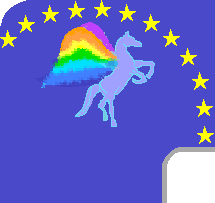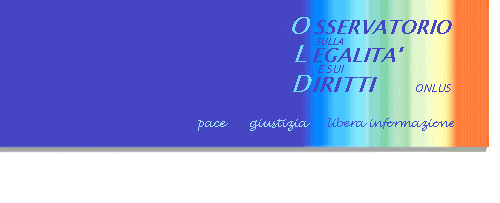

RSF
e Freedom House su liberta' di stampa in Italia
da Marco Montanari
RSF:
BERLUSCONI'S CONFLICT OF INTEREST IN THE MEDIA is the only European prime minister who also heads a media empire. His ownership of three major TV stations has serious implications for the independence of the state-owned TV network with which they compete.
Silvio Berlusconi owns Mondadori, and Mediaset, EXTENSIVE INTERFERENCE Silvio Berlusconi is also in a position to strongly influence the state-owned TV station RAI. In 2002, he lashed out at two veteran RAI reporters, accusing them of “criminally” misusing the station. The bill to settle Berlusconi’s conflict of interests was a trick Berlusconi became prime minister again in 2001 after promising during the election campaign to settle the matter in his first 100 days in office. But the bill he came up with to do this was a trick. So Berlusconi has transferred formal management of his businesses to his family and associates and any conflict of interest has therefore officially disappeared.
GASPARRI LAW NO DEMOCRACY WITH DIVERSITY The situation roused the normally reserved president of the republic, Carlo Azeglio Ciampi, who told parliament there was “no democracy without diverse and impartial news.” He struck at Berlusconi on 15 December 2003 by refusing to sign into law the “Gasparri” broadcasting reform bill that would have allowed the prime minister to keep control of his three terrestrial TV stations.
GASPARRI LAW IS THE MOST FLAGRANT AND SHOCKING EXAMPLE OF BERLUSCONI'S CONFLICT OF INTEREST VIOLATING A SENTENCE OF CONSTITUTIONAL COUNCIL BERLUSCONI Berlusconi responded on 23 December by decreeing a reprieve for one of his stations that the constitutional council had ordered to switch to satellite (which would cut much of its share value). The proposed law is the most flagrant and shocking example of Berlusconi’s conflict of interest.
FREEDOM HOUSE
Freedom of speech and the press are constitutionally guaranteed. Most press outlets are privately owned but are often linked to political parties or run by large media conglomerates that exercise some editorial influence. Concerns about the concentration of media ownership have been an issue since the election in 2001 of Silvio Berlusconi, a media magnate and Italy’s wealthiest individual, as prime minister.
The print media, which consist of eight national newspapers, two of which are controlled by the Berlusconi family, continue to provide diverse political opinions, including those critical of the government. However, Berlusconi controls or influences six of the seven national broadcast channels. Mediaset, a company in which he has a major interest and the largest private broadcaster in the country, owns three national channels, while the state-owned network (RAI), traditionally subject to political pressure, controls three.
Questions continue to be raised about the political impact of Berlusconi’s control of the media. The Osservatorio di Pavia, an independent media watchdog, reported that in the month of February, Berlusconi’s presence on television accounted for 42 percent of the time dedicated to politicians. During the year, the head of RAI, Lucia Annunziata, and one of its star television broadcasters, Lili Gruber, quit in reaction to Berlusconi’s domination of the media.
A long awaited conflict of interest bill, which was intended to resolve the contradictions between Berlusconi’s private business and his role as prime minister, was passed in July. Although the bill limits the managing control politicians have over their holdings, it does not bar them from owning companies. As a result, the bill, which was criticized as being toothless by critics, will have little impact on Berlusconi’s media empire.
In April, the parliament adopted a law on broadcasting reform, known as the Gasparri Law, which ostensibly introduces a number of reforms, such as the switch-over to digital broadcasting (scheduled to take place in 2006) and the partial privatization of RAI. The law was initially vetoed in December 2003 by President Carlo Ciampi, who was urged to do so by media organizations claiming the law threatened press freedom and undermined news pluralism.
Although the revised law has a clause that limits the maximum revenue a single media company can earn, it excludes interests in publishing, cinema, and the music industry. Critics of the law still say that it reinforces Berlusconi’s power over the media. The new law also allows one of the three Mediaset channels, Retequattro, to continue terrestrial broadcasting. The decree runs counter to a 2002 Constitutional Court ruling that demanded the channel switch to satellite by January 2004 to ensure competition. The shift to satellite would have led to a considerable loss in the station’s market value.
In December, journalists at Italy’s leading and highest-selling daily, Corriere Della Sera, protested increasing editorial interference and pressure in the newsroom from its shareholders. The newspaper is owned by RCS Mediagroup, in which 15 of Italy’s major conglomerates have a stake. Legislators moved in July toward abolishing prison sentences for libel, a development welcomed by media organizations, but the proposed amendments have yet to be adopted. Politicians and their allies filed several libel suits against journalists during 2004; in February, journalist Massimiliano Melilli was sentenced to 18 months in prison and ordered to pay 100,000 euros (US$124,400).
In July, a 76-year-old journalist and senator was placed under house arrest, relaxing his 2002 sentence of 29 months’ imprisonment for libel. Press freedom organizations criticized two separate government raids on journalists’ homes and offices, owing to the journalists’ refusal to reveal their sources for controversial, investigative reports. More than a third of the world’s people live in countries where there is no press freedom. Reporters Without Borders works constantly to restore their right to be informed. Fourty-two media professionals lost their lives in 2003 for doing what they were paid to do — keeping us informed.
___________
NB:
I CONTENUTI DEL SITO POSSONO ESSERE PRELEVATI CITANDO L'AUTORE
E LINKANDO
www.osservatoriosullalegalita.org
per mandare un intervento scrivici